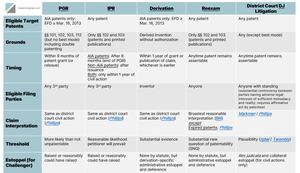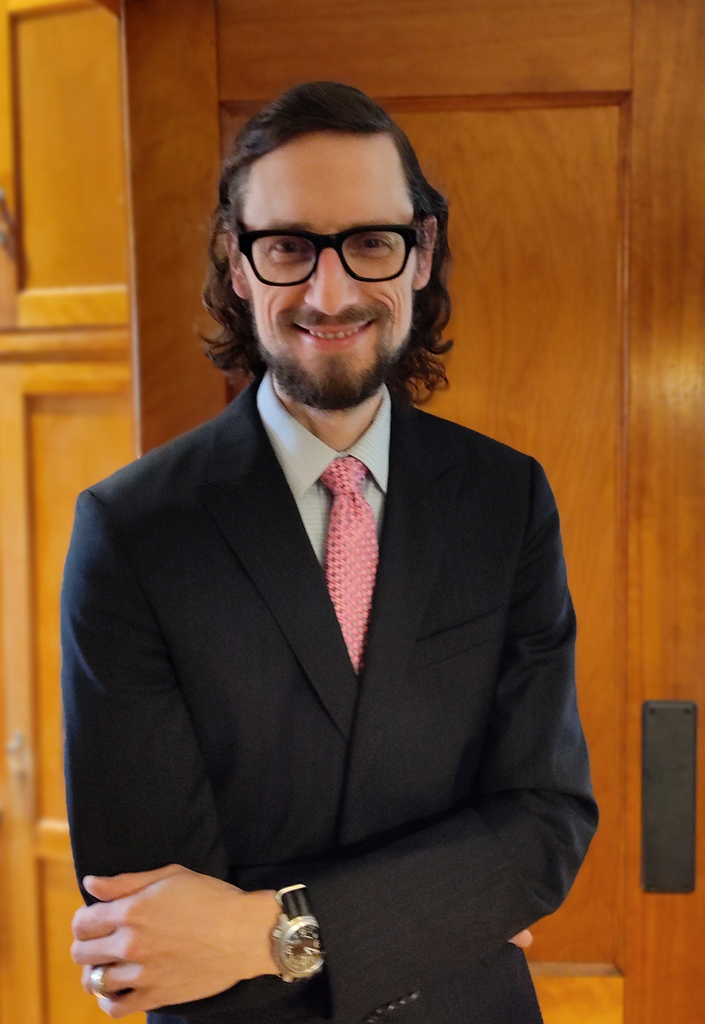It may be desired to proactively challenge the validity or patentability of a granted U.S. patent for a variety of reasons. What are the available options to challenge a granted patent either at the U.S. Patent & Trademark Office (USPTO) or in court? The following table compares the different types of proceedings and summarizes the applicable standards.
| ———————— | Post Grant Review (PGR) | Inter Partes Review (IPR) | Derivation Proceeding (DP) | Ex Parte Reexamination (Reexam) | District Court Civil Action — Declaratory Judgment (DJ Action) | |||
|---|---|---|---|---|---|---|---|---|
| Eligible Target Patents Based on Effective Filing Date (EFD) | AIA patents only: EFD ≥ March 16, 2013 | Any patent | AIA patents only: EFD ≥ March 16, 2013 | Any patent | Any patent | |||
| Available Grounds | §§ 101, 102, 103, 112 (no best mode), including double patenting | §§ 102 and 103 based on patents and printed publications (only) | Derived invention without authorization | §§ 102 and 103 based on patents and printed publications (only) | Any (except best mode) | |||
| Timing Requirements | Within 9 months of patent grant (or reissue) | AIA patents: after 9 months (end of PGR) Non-AIA patents: after issuance Both: only within 1 year of civil action | Within 1 year of grant or publication of claim, whichever is earlier | Anytime patent remains assertable | Anytime patent remains assertable | |||
| Claim Interpretation Standard | Same as district court civil action (Phillips) | Same as district court civil action (Phillips) | Same as district court civil action (Phillips) | Broadest reasonable interpretation (BRI) except Expired patents: Phillips | Markman / Phillips | |||
| Eligible Filing Parties | Any 3rd party | Any 3rd party | Inventor | Anyone | Anyone with standing (substantial controversy between parties having adverse legal interests of sufficient immediacy and reality; requires affirmative act by patentee) | |||
| Threshold | More likely than not unpatentable | Reasonable likelihood petitioner will prevail | Substantial evidence | Substantial new question of patentability (SNQ) | Plausibility (Iqbal / Twombly) | |||
| Estoppel (Attaching to Challenger) | Raised or reasonably could have raised | Raised or reasonably could have raised | None by statute, but derivation-specific administrative estoppel and deference | None by statute, but administrative estoppel and deference | Res judicata and collateral estoppel (for civil actions only) |


Austen Zuege is an attorney at law and registered U.S. patent attorney in Minneapolis whose practice encompasses patents, trademarks, copyrights, domain name cybersquatting, IP agreements and licensing, freedom-to-operate studies, client counseling, and IP litigation. If you have patent, trademark, or other IP issues, he can help.
